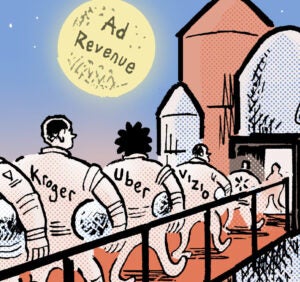CTV is the hottest growth channel in ad tech, but there’s still plenty of untapped programmatic opportunity.
That’s why Viant acquired CTV data platform IRIS.TV. The deal was announced during Viant’s Q3 earnings call on Tuesday. Viant did not disclose the terms of the deal.
A common complaint among advertisers is their lack of transparency into the CTV inventory they’re buying. IRIS.TV has video-level CTV data via its proprietary identifier. This content targeting signal tags videos with an ID that can be passed through the programmatic bid stream.
The ID provides contextual signals beyond what streaming platforms typically share about genre, sentiment and brand safety status.
A strong contextual signal for streaming “is going to be better for the whole of the open web,” Jon Schulz, CMO at Viant, told AdExchanger.
Growth trajectory
Viant and IRIS.TV, which were already partners for the past few years, have a good amount of overlap between which CTV platforms they’re integrated with.
But the acquisition will open up more opportunities for IRIS.TV to improve how its content signals inform campaign performance through testing within Viant’s DSP, Schulz said.
Giving advertisers more granular targeting and attribution data for CTV, beyond app-level or genre-level targeting, should be the proverbial tide that lifts all boats for programmatic CTV, according to Schulz.
“CTV is on the fastest growth trajectory in digital already, but it has a lot of runway as linear continues to decline,” he said. “If we can do this right and make CTV perform better, the investment will continue to follow.”
Viant started prioritizing CTV over the past two to three years, Schulz said, and that part of the business is booming. But the DSP sees plenty more room to grow. Viant achieved its best-ever quarter for CTV revenue in Q3, eclipsing the record it previously set in Q2. CTV and streaming audio combined accounted for roughly 50% of Viant’s $80 million in revenue this quarter.
Viant had been looking at acquisitions more or less from the moment it went public in February of 2021, Schulz said, and the IRIS.TV deal was the first to cross the finish line. It closed late last week, just in time to be included in Tuesday’s earnings report.
Viant now owns IRIS.TV’s assets and will add its employees to Viant’s current headcount of about 350.
Lifting all boats
But IRIS.TV’s data will not be exclusive to Viant’s DSP, Schulz said.
IRIS.TV will continue to operate as an independent, platform-agnostic company led by co-founders Field Garthwaite and Richie Hyden. Viant will take a hands-off approach to IRIS.TV’s day-to-day operations while helping the company grow, Schulz said.
IRIS.TV’s revenue will be combined with that of Viant. The latter’s Q4 projections already include their combined revenue. Viant did not break down the split between companies, but is projecting between $82 million and $85 million in Q4 revenue, compared to $64.4 million in Q4 2023.
However, given the timing of the acquisition and IRIS.TV’s relatively small size compared to Viant, “IRIS.TV is expected to have limited impact on our Q4 operating results,” Viant CFO Larry Madden told investors.
Although IRIS.TV will still be compatible with other DSPs, Viant sees opportunity to use IRIS.TV’s data to enhance its ViantAI media planning and optimization tool, Schulz said. Viant also plans to integrate the data into its Direct Access direct-to-publisher offering and is exploring ways to join the IRIS ID with Viant’s Household ID to combine content and audience targeting.
“IRIS IDs give us another level of granularity,” Schulz said.
For publishers, integrating the IRIS ID can yield higher CPMs and help them achieve better fill rates, he added. With that in mind, Viant intends to nudge CTV platforms to adopt the IRIS ID if they haven’t already.
Currently, 90% of CTV inventory is transacted programmatically, Schulz said, and major platforms such as Netflix, Amazon and Disney are flooding the zone with more inventory.
“As a publisher,” he said, “how can I monetize [my inventory] better and make what I have more valuable? With a better content signal, then by delivering better performance for advertisers.”













